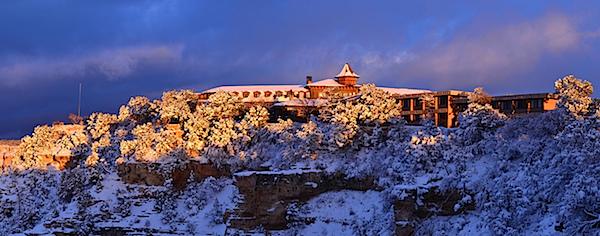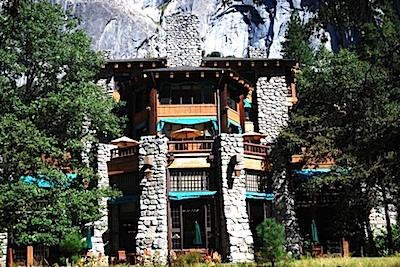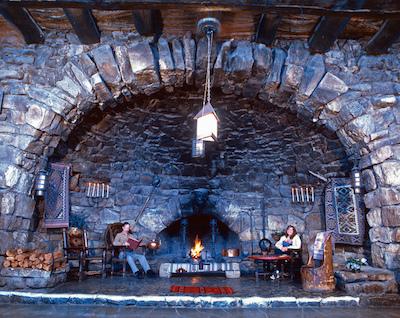
Xanterra Parks & Resorts has filed an application to trademark "El Tovar," and other lodging names on the South Rim of Grand Canyon National Park/NPS photo of El Tovar Hotel
Last fall, Xanterra Parks & Resorts was coming down to its last two months as concessionaire for the lodges and restaurants on the South Rim of Grand Canyon National Park. It had been unable to come to terms with the National Park Service over a new, 15-year pact that would take effect January 1, 2015, and had sued the agency over its contracting decisions. About the same time, Xanterra filed a slew of applications to trademark the names of those iconic lodges and restaurants covered by the contract.
Those applications, currently pending with the U.S. Patent and Trademark Office, come in the wake of news that Delaware North Co. had laid claim to trademarks to place names in Yosemite National Park, including that to The Ahwahnee Hotel, perhaps the grande dame of national park lodging.
Trademarking place names within the National Park System is not new for many products unrelated to the daily operations of a park. Old Faithful isn't just the name of a geyser, it's also tied to a gun. Denali is a national park in Alaska, and it's also a baby stroller and a medical device. Grand Teton National Park towers above Wyoming's western border, and "Grand Teton" is also a cheese and a vodka. But it's the trademarks taken out or applied for, some in recent months, on lodges and places within national parks that perhaps best underscore John Muir's belief that "nothing dollarable is safe."
Muir's full comment -- "Nothing dollarable is safe, however guarded. Thus the Yosemite Park, the beauty glory of California and the Nation, Nature's own mountain wonderland, has been attacked by spoilers ever since it was established, and this strife I suppose, must go on as part of the eternal battle between right and wrong." -- was made in 1908 in the wake of a move by the City of San Francisco to dam the Hetch Hetchy Valley in Yosemite National Park to create a reservoir for its water needs.
Leap ahead 106 years and Muir's fears are ringing loudly as concessions companies lay claim to trademarks for lodges they operate in the park and, at least in one case, place multi-million-dollar numbers to those trademarks if they lose the contract to operate those lodges.
Businesses have been making money off park names and places for decades. General Motors Corp. has taken names of parks -- Acadia and Denali, just to cite two -- and attached them to some of their vehicles. The Ballard Rifle & Cartridge Co. of Powell, Wyoming, received the "Old Faithful" trademark in 2008 for some of its firearms, while the Idaho Candy Co. trademarked some of its confections "Old Faithful" back in 1926.
Software companies have both trademarked park names and, in the case of Apple with its "Yosemite" operating system, simply affixed them to their products.

Delaware North maintains that it owns the trademark to The Ahwahnee Hotel, and won't relinquish it without compensation/Kurt Repanshek
In products unrelated to national parks, the use of park names, whether trademarked or not, might not outwardly pose a serious problem. But in the case of Delaware North Co. at Yosemite, Xanterra Parks & Resorts at Grand Canyon National Park, and the Grand Teton Lodge Co. in Grand Teton, the trademarking of place names and lodges could pose a threat to the historical integrity of the parks as well as a possible impediment to the Park Service's efforts to develop a competitive process for awarding concessions contracts, a process that should be in the best interests of the visiting public.
Delaware North (DNC) had garnered the most attention of late for its trademark claims to The Ahwahnee Hotel, Curry Village, the Wawona Hotel, and Badger Pass. It also received a trademark for "Bracebridge Dinner," a sumptuous year-end, yuletide feast with music and pagentry that has been conducted annually at The Ahwahnee since 1927.
When the Park Service last year prepared a prospectus for companies interested in running concessions in Yosemite, officials for Delaware North notified the agency that DNC had trademarks to various lodges and locations in Yosemite. If it lost the bidding for the 15-year concessions contract that begins in 2016, DNC would require the winning bidder, as part of its Leaseholder Surrender Interest, to pay $51 million for the right to those names. The concessionaire has said that when it acquired the Yosemite Park & Curry Co. in 1993, among the assets it acquired were the intellectual property, ie., the trademarks on place names to the lodges and Badger Pass.
Should the Park Service require that any concessionaire that succeeds Delaware North pay that company $51 million to retain the place names, or should a new concessionaire be given the option to avoid paying that fee by renaming those historic lodges and facilities, and so figuratively erase part of the park's history?
So far the Park Service has not officially recognized Delaware North's claim, but it has in the prospectus left open the door for renaming all the places to which the claim extends if another company wins the contract. As a result, for example, the hotel known since 1927 as "The Ahwahnee" could go by a different name.
At the same time, the Interior Department's Office of the Solicitor is looking into the matter to see if Delaware North can legally trademark those place names, which date back many decades and which Park Service officials consider part of the historical landscape and vernacular of the park.

Xanterra also has applied for a trademark to "Hermit's Rest."/NPS
A search of the U.S. Patent and Trademark Office shows that other concessionaires also have laid claims to names in other national parks. Xanterra Parks & Resorts, which last October announced its intent to sue the Park Service over its concessions contract, that same month filed an application to trademark the name "El Tovar," which is attached to the famous hotel on the South Rim of the canyon. Within two weeks of that application, Xanterra made similar applications to trademark the names of virtually all commercial businesses on, and below, the South Rim: "Phantom Ranch," "Bright Angel Lodge," "Kachina Lodge," "Yavapai Lodge," "Maswick Lodge," "Red Horse Cabin," "Arizona Room," "Lookout Studio," "Buckey O'Neill Cabin," "Thunderbird Lodge," "Trailer Village,""Hopi House," "Hermit's Rest," and "Desert View Watchtower."
All of those applicatons are pending while the patent office reviews them.
Xanterra officials could not be reached Sunday to explain why they applied for the trademarks at a time when they had little more than two months left on their concessions contract, and had not bid on the new pact.
In response to Xanterra's lawsuit, the Park Service argued that Xanterra was trying to thwart competition and that the concessionaire felt that its history on the South Rim entitled it to remain there. While the lawsuit is still pending, the Park Service and Xanterra have come to terms on a temporary one-year contract to allow the company to continue running the concessions while the Park Service works to award the longer term, 15-year contract.
Another park concessionaire, Grand Teton Lodge Co., back in August 2005 received a trademark to "Jenny Lake Lodge," an opulent lodge in the national park. The trademark was renewed in September, according to patent office records.



Comments
DNC doesn't hold a service mark or trademark for the term "Yosemite Lodge". DNC does hold a service mark for Yosemite Lodge in conjunction with a small flower logo. In fact, the service mark has this disclaimer:
NO CLAIM IS MADE TO THE EXCLUSIVE RIGHT TO USE "YOSEMITE LODGE" APART FROM THE MARK AS SHOWN
http://tsdr.uspto.gov/documentviewer?caseId=sn76366382&docId=ORC20080626...
While it is unlikely to happen, what would happen if the NPS demanded the removal of one of the structures that yielded the trademarks? Could the owner of the trademark use it in another location? I suspect not, given the limitations of granted trademarks. In which case, it would help demonstrate Runte's fundamental argument that the owners only have a right to operate on the public's land.
For more information on this subject, please visit http://www.yosemitepark.com/questions.
DNC Parks & Resorts at Yosemite
The concession fee they charge and recieve every year.
As has been pointed out, if the place names are physical features - like Half Dome, DNC has no rights. But if they build/acquire a hotel, business or facility they should have full rights to that tangible and intangible asset - especially if the NPS made them pay for it.
If you drive your car into Yosemite, it doesn't become the property of the American people even if you call your car "The Yosemite Expess".
Just for the record, since DNC seems to need the reminder, the Ansel Adams Gallery is a separate concession. It was formerly his father-in-law's property, Best's Studio, which was then renamed in 1972. I remember Ansel driving up to the studio in 1980 and signing 500 books. Visitors lined up for a hundred yards. The point is: I doubt that his family would argue today that Yosemite is somehow their "intellectual" property. Nor do they hold any rights to the studio other than a concession, no matter what they choose to call it.
Now say the family "sold" the concession. What would the name Ansel Adams Gallery be worth? Little more than Curry Village or The Ahwahnee WITHOUT the setting of Yosemite. Ansel certainly knew better than to hold his book signing even at Glacier Point. The "intangible" here remains the value 150 years of history have given the park. That value belongs to us, no matter how DNC now tries to spin the story that the Park Service somehow "forced" them to buy us out.
But I am sure they would (or at least could) argue that "Ansel Adams Gallery" is/was theirs.
I hope you are right Alfred Runte, I certainly have no expertise in this area, but nothing I have found so far in trademark law precludes DNC from doing this. Alfred if you have sites, access to trademark law attorneys, it would be interesting to see the legal perspective. There are NPS logos, etc that are protected from trademark filings, the Arrowhead is one example. But filing on a facility, for example the Ahwahnee Hotel, build by a concessionaire, well, it appears DNC has a "trademark right" here. It looks like it will have to be litigated.
I didn't know legalists or "attorneys" were so interested in the outdoors; or, is it just about the money and being able to argue legal points. One thing that does not seem to receive enough attention in this series of arguments is that "we the people" still count. If nowhere else, we count at the voting booth. I strongly believe that those who benefit from selling products and services to the public cannot "own" so-called trademark rights to historical pieces of American history. At least, that should not be allowed behind the scenes with no input from the American public. This is far bigger than legalism. What will we do next? Should we allow some vending machine vendor in the House of Congress to trademark the terms "congress," "senate," "house," or "Supreme Court?" Hmmm.....if this can be done, who owns the trademark for Niagra Falls? As a simple, common citizen I find this whole issue to be beyond "reason" and to be an issue that could lead potentially to the public boycotting these vendors who think they have a right to our history.
Call me simple minded, but I don't think I'm the only person in the general public who would view this as offensive and of very poor corporate citizenship.